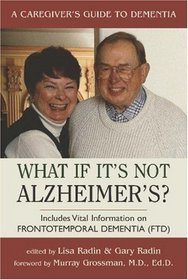Search -
What If It's Not Alzheimer's: A Caregiver's Guide to Dementia
What If It's Not Alzheimer's A Caregiver's Guide to Dementia
Author:
Not all that long ago, dementia, or a deterioration of mental ability, was considered a natural part of aging, but with increased knowledge of Alzheimer's disease and improved diagnostic capabilities, any time an older individual misplaces car keys or forgets an appointment, family members are quick to conclude that their loved one is in the... more »
Author:
Not all that long ago, dementia, or a deterioration of mental ability, was considered a natural part of aging, but with increased knowledge of Alzheimer's disease and improved diagnostic capabilities, any time an older individual misplaces car keys or forgets an appointment, family members are quick to conclude that their loved one is in the... more »
ISBN-13: 9781591020875
ISBN-10: 1591020875
Publication Date: 10/2003
Pages: 345
Rating: ?
ISBN-10: 1591020875
Publication Date: 10/2003
Pages: 345
Rating: ?
0 stars, based on 0 rating
Genres:
- Health, Fitness & Dieting >> Diseases & Physical Ailments >> Nervous System
- Health, Fitness & Dieting >> Diseases & Physical Ailments >> Alzheimer's Disease
- Health, Fitness & Dieting >> Personal Health >> Aging >> General
- Parenting & Relationships >> Aging Parents >> Aging
- Medicine >> Nursing >> Gerontology
- Medicine >> Internal Medicine >> Neurology >> General
- Medical Books >> Nursing >> Gerontology
- Medical Books >> Medicine >> Internal Medicine >> Neurology




